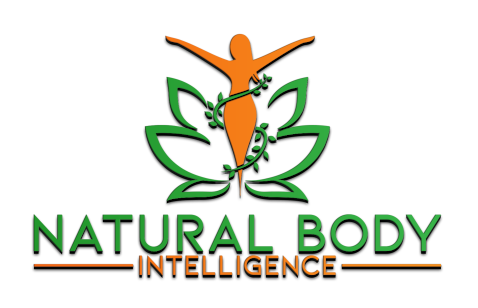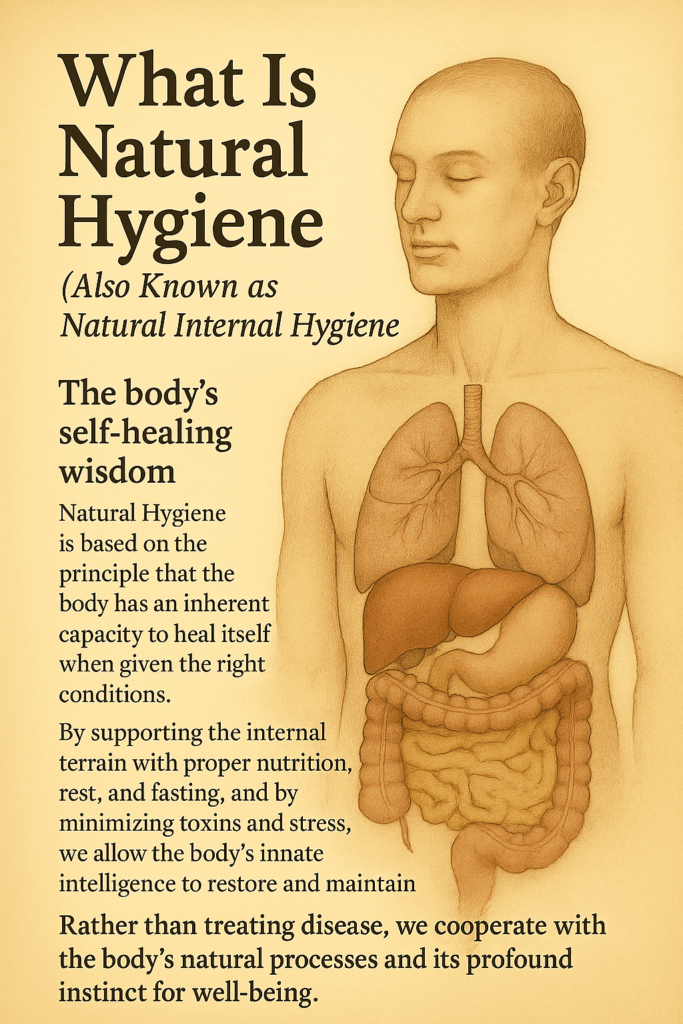(Also Known as Natural Internal Hygiene)
A complete guide blending classical Natural Hygiene with the modern Natural Body Intelligence interpretation
Natural Hygiene, also known as Natural Internal Hygiene, is one of the most misunderstood yet powerful health philosophies available to us today. Unlike modern approaches that look for cures, supplements, treatments or external interventions, Natural Hygiene teaches that the body is a self-healing, self-repairing, self-regulating organism. Health is not something we add from the outside. It is the natural condition of the body when the right environment is created within and around us.
Classical Natural Hygiene arose in the nineteenth and early twentieth centuries through the work of pioneers such as Isaac Jennings, Sylvester Graham, Herbert Shelton, John Tilden and T.C. Fry. Their teachings centred on the idea that disease is not an enemy but a biological process initiated by the body to restore balance. Symptoms are not malfunctions. They are purposeful actions of the body attempting to correct internal conditions.
Modern Natural Body Intelligence takes these principles and brings them forward into the twenty-first century, acknowledging the additional stressors, toxins, emotional pressures and environmental challenges of modern life. It preserves the purity of classical Natural Hygiene, while expanding it to include nervous system load, emotional congruence, overstimulation, relational stress and the pace of modern living.
This article unites both worlds, creating a complete, contemporary definition of Natural Internal Hygiene that is both scientifically grounded and deeply human.
The Core Principle: The Body Is Self-Healing
Every principle in Natural Hygiene begins with one truth:
the body is designed to heal itself when conditions support healing.
Cells repair automatically. Tissue regenerates. Waste is eliminated. Hormones rebalance. Inflammation reduces. Energy rises. Clarity returns. This is not something we achieve through effort. It is something the body constantly works towards.
When healing does not occur, it is because the conditions for healing are missing. The environment is obstructed by:
- accumulated waste
- chronic stress
- poor diet
- stimulants
- sleep disruption
- negative emotions
- toxic exposures
- lack of rest
- lack of sunlight
- poor breathing
- shallow hydration
- overwork
- congested lymph
- weakened digestion
Disease is not the cause of suffering. It is the body’s solution to these internal conditions.
Toxaemia: The Foundation of Disease
Classical Natural Hygiene teaches that all disease begins with one state: toxaemia.
This means the body carries more waste, debris and metabolic by-products than it can safely eliminate.
When waste accumulates:
- blood thickens
- lymph stagnates
- digestion becomes sluggish
- tissues become inflamed
- energy drops
- immunity weakens
- symptoms appear
This is not a failure of the body. It is an intelligent attempt to remove what is burdening the internal terrain.
Modern Natural Body Intelligence expands this concept by recognising additional modern sources of toxaemia that did not exist 100 years ago:
- microplastics
- industrial food chemicals
- chronic EMF stress
- artificial light
- psychological trauma
- social media overstimulation
- environmental pollution
- indoor air contamination
- pharmaceutical residues
- high-stress lifestyles
The body is constantly trying to maintain internal cleanliness, but modern life overwhelms these systems quickly. Natural Internal Hygiene restores the conditions that allow the body to cleanse at the rate it needs.
The Laws of Life: Foundations of Natural Hygiene
Traditional Natural Hygiene teaches the “Laws of Life”, the biological requirements of human health. These include:
- fresh air
- pure water
- sunlight
- rest
- fasting
- natural food
- emotional balance
- clean environment
- natural movement
- healthy relationships
- mental peace
- purpose
- connection to nature
Modern Natural Body Intelligence adds two further fundamental needs:
- nervous system coherence
- authentic alignment with one’s truth
These needs are just as biological as food or sleep. A human being cannot digest properly, detoxify properly or repair properly while emotionally suppressed, overwhelmed or living out of alignment.
Rest and Fasting: The Two Deepest Healers
Rest is the foundation of healing.
Fasting is the accelerator.
Classical Hygienists observed that rest is when the body repairs, and fasting is when the body clears waste rapidly. Modern life constantly drains energy through stimulation, screens, late nights and emotional overload. This means most people live in a near-constant state of vital exhaustion.
When digestion pauses and the nervous system softens, the body redirects energy to:
- detoxification
- tissue repair
- immune strengthening
- hormonal balance
- deep cellular clean-up
This is why fasting, early nights and restful living are central pillars in both Natural Hygiene and NBI.
Food: The Fuel That Supports Cleanliness
Natural Hygiene teaches that humans thrive on simple, natural, water-rich foods, especially fruits. These foods digest cleanly, leave little residue and hydrate the body at the cellular level.
Heavy foods, processed foods, oils, animal products, refined foods and stimulants burden digestion, create metabolic waste and slow detoxification.
Natural Internal Hygiene frames food not only as fuel but as a source of internal clarity.
A clean diet is clean chemistry.
Clean chemistry produces clean tissues.
Clean tissues create clean emotions and clean thinking.
This is where the teachings deepen: internal hygiene is emotional, mental, spiritual and relational, not only physical.
The Nervous System and the Modern Terrain
Classical Natural Hygiene acknowledged the role of emotions, but modern NBI places the nervous system at the centre of the internal terrain.
Chronic fight-or-flight creates:
- digestive shutdown
- impaired detoxification
- chronic inflammation
- shallow breathing
- tension in the organs
- disrupted sleep
- adrenal strain
- immune suppression
While classical NH focused on physical causes, NBI recognises that emotional repression, trauma, disconnection and relational stress are as toxic as poor food.
When the nervous system becomes calm and coherent, the internal environment shifts immediately. Digestion improves, detoxification accelerates, hormones stabilise and the mind becomes clearer.
Symptoms: The Body’s Healing Language
Both classical NH and NBI teach that symptoms are not diseases but the body’s attempts to heal.
These include:
- fever
- mucus
- diarrhoea
- vomiting
- skin eruptions
- inflammation
- fatigue
- headaches
- pain
All are intelligent biological actions meant to protect the body and restore balance. Suppressing symptoms suppresses healing.
Modern NBI adds an emotional layer: symptoms also reflect emotional pressure, unprocessed experiences and misalignment.
The body speaks through physiology and psychology at the same time.
Natural Internal Hygiene: A Modernised Framework
The modern NBI approach expands Traditional Natural Hygiene into a complete, whole-person model that includes:
- internal terrain chemistry
- nervous system regulation
- emotional honesty
- boundaries and relationships
- environmental influences
- light, sunlight and circadian biology
- movement and posture
- authentic expression
- inner truth and coherence
- purpose and meaning
This creates a deeper, broader definition of healing:
The body heals when the whole person is allowed to come back into alignment.
Why Natural Hygiene Matters Today More Than Ever
Modern life challenges human biology in ways our ancestors never experienced. The body has not adapted to:
- processed food
- chronic stress
- artificial light
- indoor living
- chemical exposure
- constant stimulation
- emotional fragmentation
- lack of community
Natural Internal Hygiene is not outdated. It is urgently relevant. It offers a clear, nature-aligned path through a world that has become increasingly disconnected from biological truth.
The Goal of Natural Hygiene and NBI
The goal is simple:
To create the conditions in which the body can express its natural state of health.
Not through force.
Not through treatments.
Not through supplements.
But through cooperation with the body’s intelligence.
When the internal terrain is clean, the mind is clear, the emotions are authentic, and the environment supports life, health becomes the natural result.

